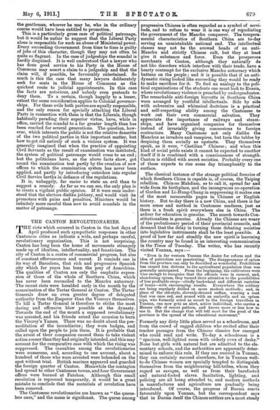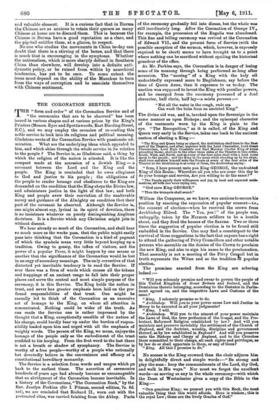THE CANTON REVOLUTIONARIES. T HE riots which occurred in Canton in
the last days of April produced. such sympathetic responses in other Cantonese cities as indicate a wide, and perhaps careful, revolutionary organisation. This is not surprising. Canton has long been the home of movements strangely made up of idealism, intellectuality, and fanaticism. The city of Canton is a centre of commercial progress, but also of constant effervescence and unrest. It reminds one in its way of Barcelona, that rich and progressive Spanish city which for years has been the prey of Anarchism. The qualities of Canton are only the emphatic expres- sion of those of the whole of Southern China, which has never been reconciled to the Manchu autocracy. The recent riots were heralded early in the month by the assassination of the Tartar General at Canton. The Tartar Generals draw an even greater degree of delegated authority from the Emperor than the Viceroys themselves. To kill a Tartar General is therefore to strike the most daring and offensive blow possible at the dynasty. Towards the end of the month a supposed revolutionary was arrested, and his friends seized the occasion to burn the Viceroy's Yamen. There was no doubt about the pre- meditation of the incendiaries ; they wore badges, and called upon the people to join them. It is probable that the arrest of their companion caused. them to take violent action sooner than they had originally intended, and this may account for the comparative ease with which the rising was suppressed. The casualties among the revolutionaries were numerous, and, according to one account, about a hundred of those who were arrested were beheaded on the spot without trial. British marines appeared and guarded the foreign quarter of Canton. Meanwhile the contagion had spread to other Cantonese towns, and four Government offices were burned at Fatshan. Although this small revolution is repressed temporarily, it would be a great mistake to conclude that the materials of revolution have been removed.
The Cantonese revolutionaries are known as " the queue- less ones," and the name is significant. The queue among progressive Chinese is often regarded as a symbol of servi- tude, and to refuse to wear it is one way of repudiating the government of the Manchu conqueror. The tempera- mental characteristics of Southern China are to-day serving an unmistakable national end. The intellectual classes may not be the avowed heads of an anti- Manchu and strictly Chinese cult, but they at least give it substance and force. Even the prosperous merchants of Canton, although they naturally do not like disorders which interfere with their trade, have a hearty contempt for the exclusive Manchu autocracy which battens on the people ; and it is possible that if an anti- dynastic rising looked like succeeding they would be ready to make sacrifices for it. To find an analogy to the poli- tical organisations of the students one must look to Russia, where revolutionary violence is preached by undergraduates. The remarkable anti-foreign boycotts in Southern China were arranged by youthful intellectuals. Side by side with subversive and whimsical doctrines is a practical and self-respecting ability among the Cantonese to work out their own commercial salvation. They appreciate the importance of railways and steam- ships, and have organised companies for themselves instead of invariably giving concessions to foreign contractors Many Cantonese not only dislike the Manchus as invaders and vampires, but turn the tables by despising them socially as upstarts. They themselves speak, as it were, " Castilian' Chinese ; and when this kind of social pride exists it cannot be expected to smother itself if it is combined with a consciousness of strength. Canton is riddled with secret societies. Probably every one of these expects to rise some day triumphantly to the surface.
The classical instance of the strange political frenzies of which Southern China is capable is, of course, the Taiping rebellion. Chinese Mandism, so to call it, spread far and wide from its birthplace, and the incongruous co-operation of Gordon and Li-Hung-Chang in suppressing it makes one of the most memorable pages in Chinese or English history. But to-day there is a new China, and there is far more sense and method in Cantonese madness, just as there is a fresh spirit everywhere else in China. The ardour for education is genuine. The march towards Con- stitutionalism is genuine. Already the Chinese are weary of the probationary period of their provincial councils, and demand that the delay in turning these debating societies into legislative instruments shall be the least possible. A proof of how far and steadily the new spirit is leavening the country may be found in an interesting communication in the Times of Tuesday. The writer, who has recently visited Yunnan, says :- " Even in far western Yunnan the desire for reform and the idea of patriotism are penetrating. The disappearance of opium from the province can only be described as wonderful. Prohibition has caused less distress to the agricultural population than was generally anticipated. From the beginning, the cultivators were wise enough to recognise that the officials were in earnest, and, abandoning opium, they turned their attention to the possibilities of less profitable crops—chiefly buckwheat and different varieties of beans—with encouraging results. Everywhere the soldiery are being regularly drilled on more modern methods ; and, in place of the old-style, slovenly-dressed ruffian, wearing a coat that was once red, and armed with an umbrella and an opium pipe, who formerly acted as escort to the foreign travellers in Yunnan, one now gets an alert, active individual, who carries a Hauser rifle of recent pattern, and knows more or less how to use it. But the change that will tell most for the good of the province is the spread of the educational movement."
Formerly any dirty little place served as a schoolroom, and from the crowd of ragged children who recited after their teacher passages from the Chinese classics few emerged who could read and write. To-day a schoolroom is a " spacious, well-lighted room with orderly rows of desks." None but girls with natural feet are admitted to the ele- mentary schools, and the authorities are apparently deter- mined to enforce this rule. If they can succeed in Yunnan, they can certainly succeed elsewhere, for in Yunnan well- to-do Chinese women are specially tempted to distinguish themselves from the neighbouring hill-tribes, whom they regard as savages, as well as from their barefooted and natural-footed slaves. Sanitation, lighting, and policing are all being attended to, and modern methods in manufactures and agriculture are gradually being introduced. Of course, the progress of Burma reacts favourably upon Yunnan, but the correspondent says that in Burma itself the Chinese settlers are a most steady and valuable element. It is a curious fact that in Burma the Chinese are as anxious to retain their queues as many Chinese at home are to discard them. This is because the Chinese in Burma have a good reputation as a class, and the pig-tail entitles them, at a glance, to respect.
No one who studies the movements in China to-day can doubt that there is a stirring of the bones, and that there is much that is encouraging in the symptoms. Whether the nationalism, which is more sharply defined in Southern China than elsewhere, will develop into a definite anti- dynastic policy, or be ruined from within by anarchical tendencies, has yet to be seen. To some extent the issue must depend on the ability of the Manchus to turn from the ways of corruption and to associate themselves with Chinese sentiment.











































 Previous page
Previous page